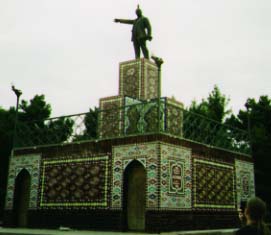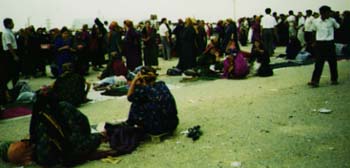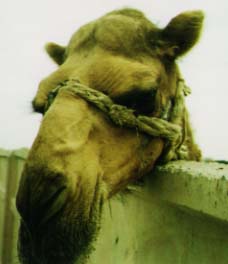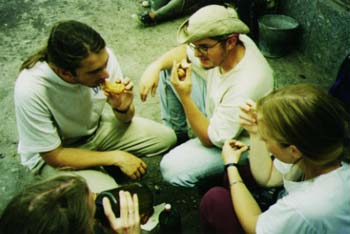
Turkmenistan - 1995

The boat ride began so optimistically.
I had been sick to my stomach the night before [was it the adjustment
from heavenly Turkish shaslik and vegetables to food reminiscent
of gulag movies or the lingering smell from the Baku metro?],
but things had started to quiet down inside. In a way, I was almost
looking forward to it. You see, I have this not-so-secret 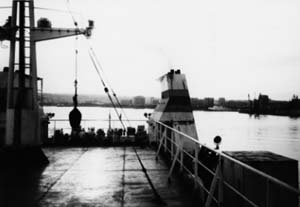 desire to cross a major ocean
by boat. Perhaps not as large a boat as I now found myself in,
but in some ways, a boat is a boat is a boat, and since the longest
sea trip I had taken up to that point was from Vancouver to Victoria,
crossing the Caspian Sea was a pretty big deal. Yeah, I know,
it's no ocean, but so what? It's the Caspian Sea. Most people
can't find the Caspian on a map, and I had the chance to cross
it. But, there was another reason to be optimistic, hopeful, happy.
We had our own cabin. Actually two [Megan and Scott in one, Jeff,
Aaron, Chris and I in the other]. And the privacy that would provide,
even over the overnight length of the trip, was well worth the
overpriced ticket and day spent to acquire it. Or so I thought.
desire to cross a major ocean
by boat. Perhaps not as large a boat as I now found myself in,
but in some ways, a boat is a boat is a boat, and since the longest
sea trip I had taken up to that point was from Vancouver to Victoria,
crossing the Caspian Sea was a pretty big deal. Yeah, I know,
it's no ocean, but so what? It's the Caspian Sea. Most people
can't find the Caspian on a map, and I had the chance to cross
it. But, there was another reason to be optimistic, hopeful, happy.
We had our own cabin. Actually two [Megan and Scott in one, Jeff,
Aaron, Chris and I in the other]. And the privacy that would provide,
even over the overnight length of the trip, was well worth the
overpriced ticket and day spent to acquire it. Or so I thought.
Actually, just getting on the boat in
Baku proved to be as difficult as getting the tickets. As I had
come to appreciate in so many other socialist [read: stupidly
inefficient] countries, a line doesn't have to have a logical
concusion, a purpose, or even make sense. It doesn't even have
to possess a single form, and the line leading into the ferry
was about freelance a it gets. The chaos of a line as a lot to
do with three things: how long the people have been waiting, what
they are waiting for, and how much stuff they have with them.
This line had it all. Delays [hours and hours of them], the inability
to understand why we couldn't just board, and the masses of people,
most with boxes and boxes of things with turned out to be chewing
gum or cans of tomatos or gym socks, all waiting to hit the docks
of Krasnosvosk and start trading. Of course, they were making
the crossing for about two bucks and we paid many times more than
that, but the conditions they had to endure once on board made
it well worth it. Of course, you had get on board to realize that,
and we were stuck, withering in the dusty June heat, day-dreaming
about ice water and air conditioning. By the time the line started
moving, we saw the real hold up. CIS guards, armed, were guarding
the gangplank and bullying everyone they could. The more loaded-down
a traveller, the more they were subjected to scrutiny. Ironically,
for as slowly as the line moved, everything speeded up very quickly
once we reached the solders. 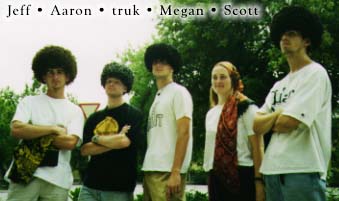 Something about an 18-year old waving an AK-47 in
your face and yelling Russian at you really makes you want to
get out of his way.
Something about an 18-year old waving an AK-47 in
your face and yelling Russian at you really makes you want to
get out of his way.
On board, we found our cabins and took our bunks. While the rest of the folks were negotiating the bribery maze on the docks, the necessities like the bathrooms [more repulsive than you could ever imagine; another fine combination of European-style toilets and a Turkish-style squat resulting in a unimaginable gravy of filth] and the ship's store [overpriced drinks - surprise - and a staff that seemed to change by the hour. But all would be fine; after all, the other passengers were nice enough, and, anyway, it was only an overnight voyage, right?
We left that night, the sun setting on our backs, heading out to rough seas. Chris, Aaron, and I spent some time on the top deck, horsing around and feeling truly strange that we were on this boat at all. There were also a bunch of guys up there milling around, talking, and taking in the sights. Later, I learned that quite a few men sleep on the top deck, mainly to get out of the crowd below of screaming children and stacks of boxes.
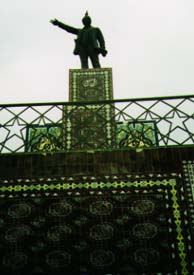 My
primary problem,which was finally becoming apparent later in the
evening, was that I was feeling even more sick on the boat than
what had afflicted me in Baku. And, no, i t wasn't seasickness.
I've been fortunate enough to never feel seasick. No, this was
something completely different and entirely repulsive. And, worse
than the constant desire to visit the inhuman toilet faculities
every ten minutes was something every traveller fears: a feeling
of weakness. It was difficult to even raise my body out
of bed, much less consider the fact that I would have to lug this
seventy pound pack around at the destination port. I guess I hadn't
been able to hold food down long enough to get any energy out
of it. The rest of the evening found me falling in and out of
consciousness, trying to get up enough energy for that next trip
to the bathroom. To make matters worse, itwas a difficult thing
to even get out of the cabin. Random people would just swing by
and open the door, so we had to start locking it. Then, they started
knocking. We answered the door for a while, but eventually, seeing
that they just were getting off on harrassing us, we started ignoring
them. But getting out of our cabin fortress was difficult, especially
at the frequency with which I had to do it. My mind began to focus
on getting off this boat and onto land, away from this mob on
the boat. We were to arrive by morning, and in my fits of sleep
and dyleria, fantasies of a warm meal almost drove me to madness.
I happily expected to be shaken awake and told that I had five
minutes to get off the boat.
My
primary problem,which was finally becoming apparent later in the
evening, was that I was feeling even more sick on the boat than
what had afflicted me in Baku. And, no, i t wasn't seasickness.
I've been fortunate enough to never feel seasick. No, this was
something completely different and entirely repulsive. And, worse
than the constant desire to visit the inhuman toilet faculities
every ten minutes was something every traveller fears: a feeling
of weakness. It was difficult to even raise my body out
of bed, much less consider the fact that I would have to lug this
seventy pound pack around at the destination port. I guess I hadn't
been able to hold food down long enough to get any energy out
of it. The rest of the evening found me falling in and out of
consciousness, trying to get up enough energy for that next trip
to the bathroom. To make matters worse, itwas a difficult thing
to even get out of the cabin. Random people would just swing by
and open the door, so we had to start locking it. Then, they started
knocking. We answered the door for a while, but eventually, seeing
that they just were getting off on harrassing us, we started ignoring
them. But getting out of our cabin fortress was difficult, especially
at the frequency with which I had to do it. My mind began to focus
on getting off this boat and onto land, away from this mob on
the boat. We were to arrive by morning, and in my fits of sleep
and dyleria, fantasies of a warm meal almost drove me to madness.
I happily expected to be shaken awake and told that I had five
minutes to get off the boat.
But morning broke with no such wake-up call. In fact, a quick check on the top deck verified the worst of the possibilities (short of sinking). We were right where we were the night before. The shoreline of Baku was apparent in the distance, and little ships (fishing boats?) could be seen heading into port. As we came to find out, a storm out at sea kept the ship from sailing at all during the night. And it would be hours until we started moving forward. To occupy our time, we tried out the galley (mystery meat in the truest sense of the word), played cards, and bought cokes to fend off the boredom. I came to see it as a kind of imprisonment, being sick on a ship like that. I thought that land and the ability to stretch out and actually walk on dirt would make me well again. Had I not felt ill, I would have had more patience. But sickness, combined with a lack of language skills to find out what was going on, made me feel as though I would never get off the ship.
The next morning, however, did bring a wake-up call and a frantic gathering of bags as we fought to get out of our cabins and up on the deck to disembark. There was a long wait to get off the ship, just like there was to get on, with no apparent cause. Then, all at once, everyone started rushing one of the gangplanks to get off. People who had been waiting patiently for hours before were all pushing over anyone, even their own family, to disembark.
Arrival in Turkmenbashi brought more delays. We didn't have visas for Turkmenistan (having heard from the Turkmen embassy in Washington D.C. that we could buy them at the border for $10). As a result, we were put in what seemed to be an abandoned stone house near the port entrance to await processing. It took hours for all of the gum salesmen and entrepreneurs to pass customs, and finally we had our turn. The customs official said, no, the visa is $20 for Americans. Period. No copy of the letter from the embassy, no pleading, no pressuring could change his mind. He happily took our extortion money with a smile, scribbled something on our passports, and send us on to town.
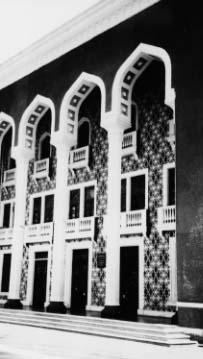 And what a town indeed. We had seen some bizarre
architecture in Baku, but Turkmenbasi (which means "father
of the Turkmen", a name given to the town by its "president"
in honor of himself) had it all. To the right, you can see one
of the government buildings there. Check out the crazy Persian
influances and the interesting tile work on the outside walls.
This place was impressive without being, well, too "native."
I still can't see how the Russians could live with this or sanction
its building. Even the train station [below] is pretty kooky,
with the standard train station layout combined with interesting
trim on the roof and a nutty barbershop-like paint job on the
outside. Inside, it looked like you could have been in a small
Bulgarian town's train station or anywhere in Eastern Europe.
Outside, there was no doubting your geographical location.
And what a town indeed. We had seen some bizarre
architecture in Baku, but Turkmenbasi (which means "father
of the Turkmen", a name given to the town by its "president"
in honor of himself) had it all. To the right, you can see one
of the government buildings there. Check out the crazy Persian
influances and the interesting tile work on the outside walls.
This place was impressive without being, well, too "native."
I still can't see how the Russians could live with this or sanction
its building. Even the train station [below] is pretty kooky,
with the standard train station layout combined with interesting
trim on the roof and a nutty barbershop-like paint job on the
outside. Inside, it looked like you could have been in a small
Bulgarian town's train station or anywhere in Eastern Europe.
Outside, there was no doubting your geographical location.
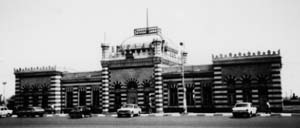
Below is the scene across the street from the train station, what I think is the main government building because of its location in the middle of a central square and the fact we saw a wedding take place right outside. This building is a little toned down compared to the others, but it is still pretty strange. You can make out the cool entryway if you really squint...
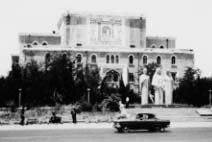
Our main concern in Turkmenbashi was to get train tickets out. The scene at the train station was yet another mob scene, only this time with old Russian pensioners and mean Turkmen mothers holding children. This crowd was a bit tougher than the others we had seen so far. Whatever these people had learned at one time about the idea behind a line seemed to have disappeared. Instead, there was a clump, a lump, if you will, of folks trying to get tickets. By tag-teaming (a improv method of standing inside the mob as long as you can, calling for help, being pulled free of the lump, and being replaced by another of the group), a skill much practiced over the next month, we were able to finally convince the humped-over official behind the glass to sell us train tickets to Ashkabat.
With that mission accomplished, our minds turned to exchanging money and acquiring food. Getting Turkmen money was simple; not getting ripped off was not so easy. Money changers buzzed like flies around the one money exchange booth near the train station. Set up in what looked to be portable housing, the money exchange went something like this:
Argue with them about the amount? Hah. Forget it. They were probably the only place semi-official. Besides, we were all starving at this time. The last time we had an actual meal was the day before, with the mystery meat in the galley on the ship. Looking around, though, there weren't many culinary experiences to be had. In fact, all that we could find the few hours before our train to Ashkabat left was a new experience to me: fried bread. While I thought this an interesting take on bread preparation, I should have been readying myself for more of it. It seems to be a staple of the Turkmen diet.
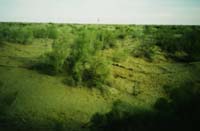 On
to Ashkabat. The view as we rolled through the desert was astounding
in its bleakness. I hadn't every been to a desert like it before.
While seemingly lifeless, sage brush and prickly bushes were everywhere
on the horizon. In fact, the horizon itself was more a blur than
a line. One could squint a bit and think they could see the curvature
of the earth. Something about it reassured me, though. I was very
releved to be off the boat, and the speed of travel on the train
(and the dry breeze coming through all of the open windows) was
a welcome change to the ferry.
On
to Ashkabat. The view as we rolled through the desert was astounding
in its bleakness. I hadn't every been to a desert like it before.
While seemingly lifeless, sage brush and prickly bushes were everywhere
on the horizon. In fact, the horizon itself was more a blur than
a line. One could squint a bit and think they could see the curvature
of the earth. Something about it reassured me, though. I was very
releved to be off the boat, and the speed of travel on the train
(and the dry breeze coming through all of the open windows) was
a welcome change to the ferry.
